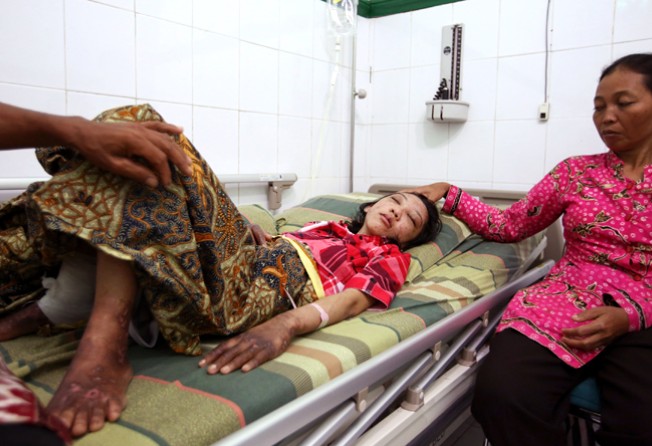Indonesian helper, 23, in critical condition after alleged beatings by Hong Kong employers
Police refuse to investigate case of Erwiana Sulistyaningsih without more details

Hong Kong police have refused to pursue an investigation into the case of an Indonesian domestic helper who has been left in a critical condition after she was allegedly abused and beaten by her Hong Kong employers.
Erwiana Sulistyaningsih is currently undergoing treatment at an Indonesian hospital after leaving Hong Kong following eight months of alleged abuse, said the Hong Kong branch of the Association of Indonesian Migrant Workers.
A police spokeswoman said the case has not been turned over to an investigation officer. She said: “The helper’s employment agency made a report to police on January 12 but the agency did not provide evidence to confirm where her injuries came from. We can just hope to get more details."
This has drawn shock and disappointment from the city’s lawmakers and human rights advocates.
“Anytime someone is physically harmed there is no reason why police should not investigate,” lawmaker Charles Peter Mok said today.
Fernando Cheung Chiu-hung, of the Labour Party, said: “If a person is killed and no one reports the murder, I wouldn’t think police would want to wait for someone to turn up to provide evidence before starting an investigation.”
Sulistyaningsih had arrived in Hong Kong on May 27, 2013 to work for employers in Tseung Kwan O in the New Territories. She returned to Indonesia on the evening of January 10, requiring assistance from a friend to walk through Hong Kong airport because much of her body, including legs and feet, were covered in cuts and burns, according to Sringatin, spokeswoman for the Association of Indonesian Migrant Workers.
Her employer had given her HK$100 and a t-shirt and asked her not to speak with any Indonesians before boarding the plane, said Sringatin. Sulistyaningsih had not sought help from airport customs officers, according to the Immigration Department.
The 23-year-old is currently in a “critical condition” in Amal Sehat Islamic Hospital in the city of Sragen, Central Java Province of Indonesia, and it is unknown when she will be released from hospital, said Sam Aryadi, Vice Consul for Public Affairs for the Indonesian Consulate General of Hong Kong. Aryadi said the consulate is currently preparing a formal report for police.
But advocates are calling on Hong Kong police to investigate the case immediately.
“In such an extreme case of violent abuse, it would strike me as the police’s responsibility to investigate and gather evidence, not agencies to find evidence prior to the police making an investigation,” said Robert Godden, Asia-Pacific Campaign Coordinator at Amnesty International.
Godden said there are elements in Sulistyaningsih’s case, such as the alleged HK$18,000 fees that she was required to pay to her employment agency, which should raise alarm about the possibility that her situation constituted a case of human trafficking. Human trafficking is defined by the United Nations as “use of force or other forms of coercion…for the purpose of exploitation.” Hong Kong should coordinate with Indonesian authorities to investigate more details of the case, said Godden.
Sulistyaningsih’s employment agency, Chan’s Asia Recruitment Centre, which is based in Causeway Bay, did not respond to South China Morning Post’s requests for comment. Hong Kong law stipulates that agencies can charge helpers no more than HK$401, but Godden said it is common for agencies to charge as much as HK$21,000 and some would withhold helpers’ passports, employment contracts and bank cards until the debt has been repaid.
Leo Tang Kin-wa, organizing secretary at the Hong Kong Confederation of Trade Unions, raised concerns that Sulistyaningsih was scared to file a report to police because of Hong Kong’s mandatory “live-in” policy for domestic helpers.
“Why did this case just come to public attention after the helper returned to Indonesia? It is because Hong Kong has failed to provide a safe environment for workers. She was forced to live with her employers, and there were no public-funded crisis shelters for helpers that she could have escaped to. It is very hard for helpers in Hong Kong to seek help.”
Mok said that the government should “revisit” mandatory live-in rules to assess whether abolishing the rule would reduce the occurrences of abuse cases, and Cheung said the government should also consider removing the “two-week” rule.
“If helpers want to quit abusive environments they would have to press charges within two weeks and afterward cannot work and have no ways to sustain themselves in Hong Kong,” Cheung said. "Many choose to return instead to their home countries, saddled with agency fee debt."
Last September, the employers of Indonesian helper Kartika Puspitasari, described by the presiding judge as “cruel” and “vicious”, were found guilty of systematic abuse over the span of two years.